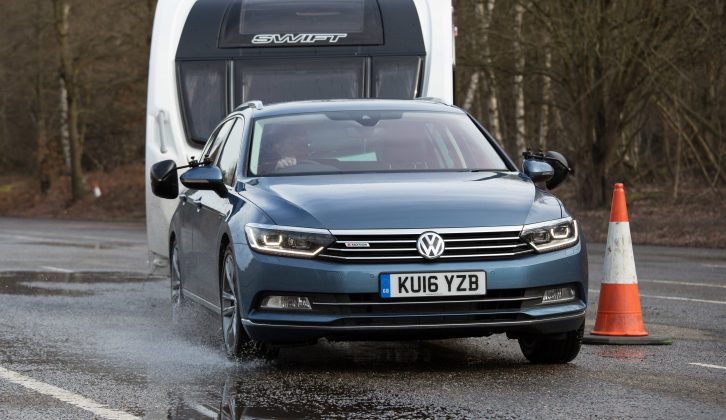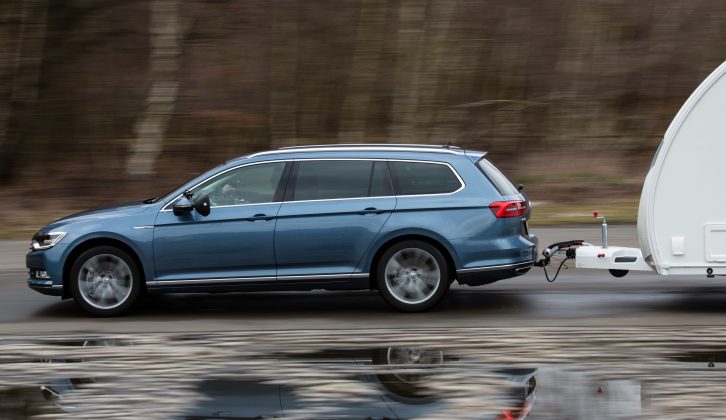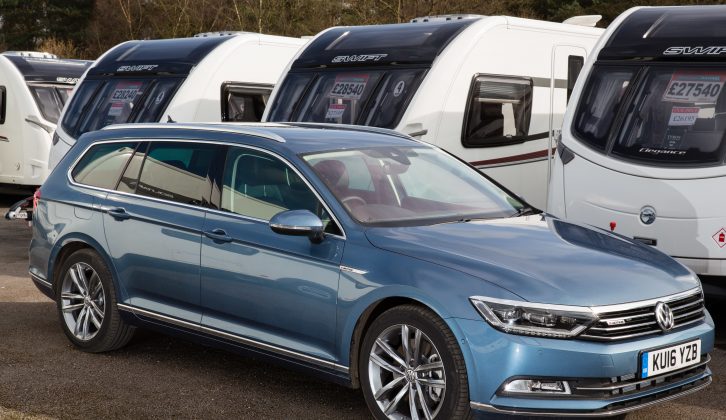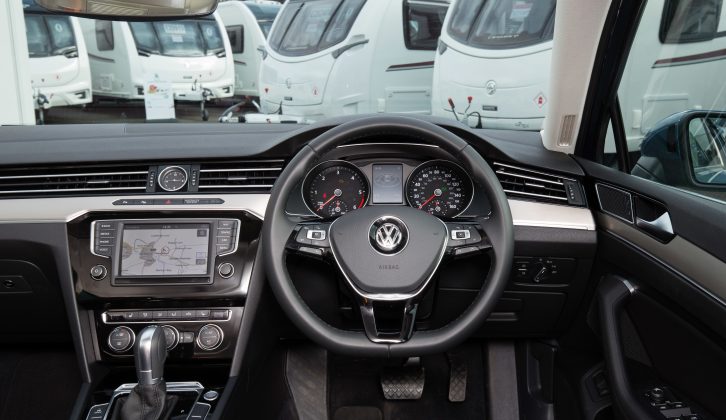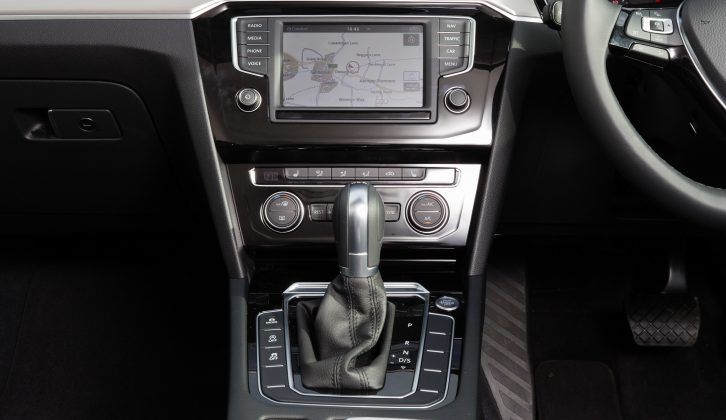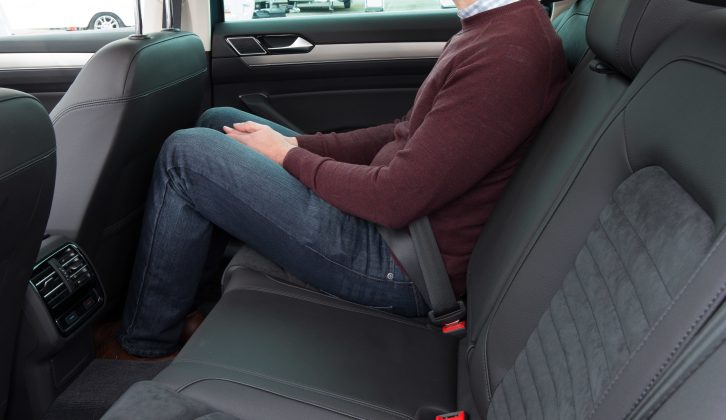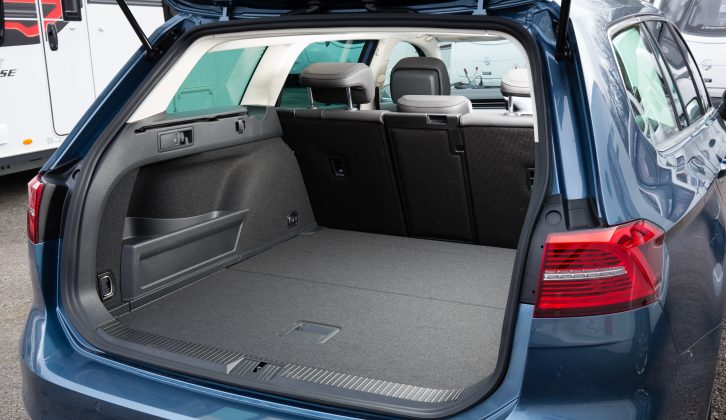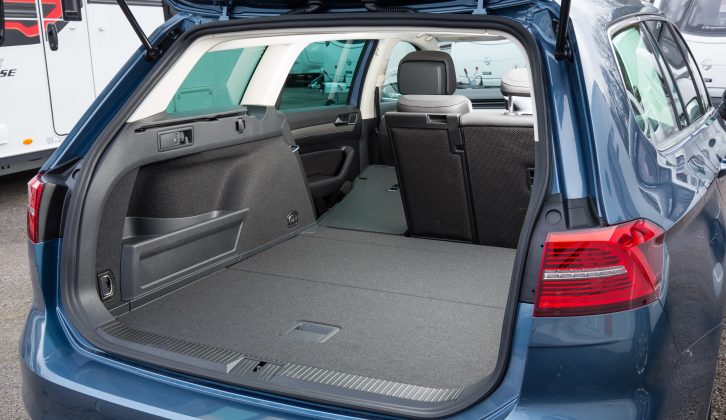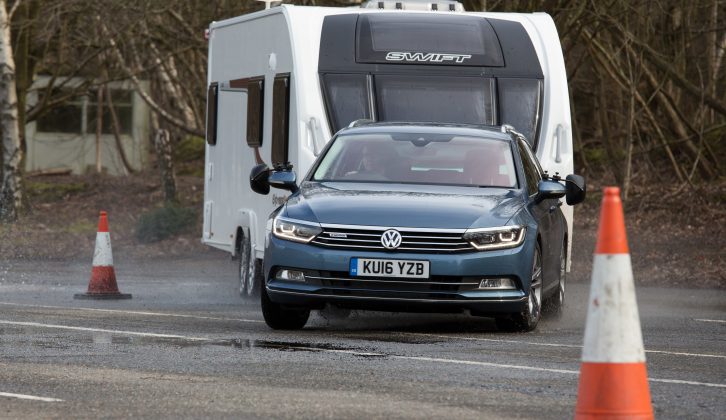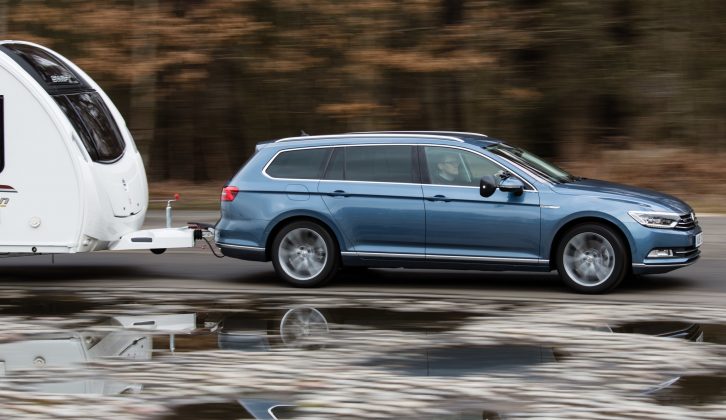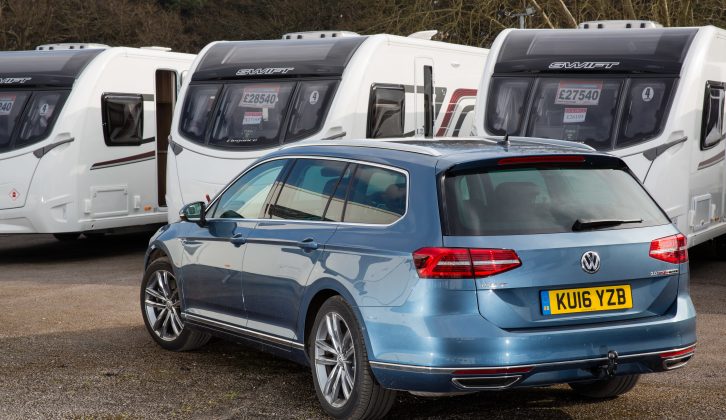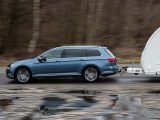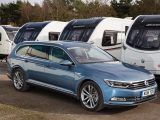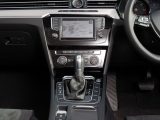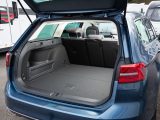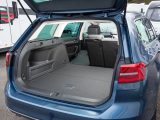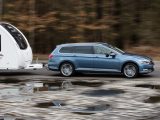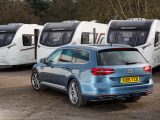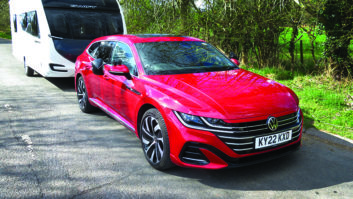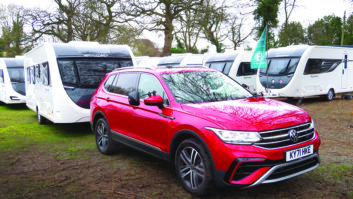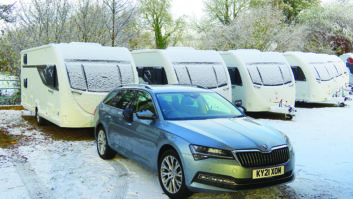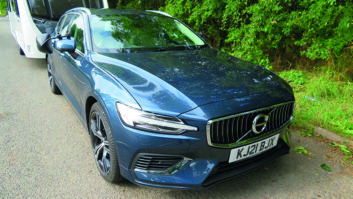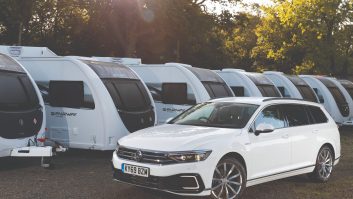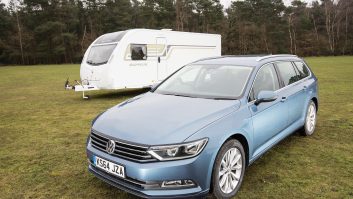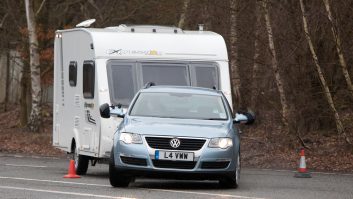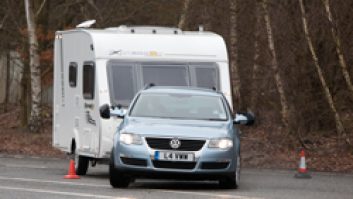Verdict
Judged purely on its towing ability, the Passat 4Motion is exceptional. The power and performance grab you first.
You don’t expect such an understated and sensible-looking car to be so fast, but it really flies, even when pulling a twin-axle tourer. The four-wheel drive makes the most of that performance in any weather.
The more you tow with it, the more you appreciate how stable it is. The Passat goes where it is pointed, and the tourer follows. It seems to shrug off towing as if it were no more demanding than driving to the shops.
When you ask the 4Motion to do mundane, everyday jobs such as picking up the weekly groceries, it’s just as capable as any other Passat Estate. Steer clear of the sportiest suspension mode and the 4Motion rides firmly but comfortably, and it’s easy and unintimidating to drive, helped by good all-round visibility and the smooth-shifting DSG transmission. If you take the car the long way home, you’ll find that it’s satisfying to drive.
The Passat may be priced to compete against prestige-badge rivals, but the cabin is smart enough to stand the comparison. What’s more, it is much more practical than any upmarket estate costing similar money.
On the negative side, the engine is gruff and you’ll stop for fuel more often than when driving one of the less powerful Passats. For most caravanners, most of the time, the 150PS car is better value. But for towing heavier vans in all weathers, the 4Motion is hard to beat.
Pros
The engine is seriously strong, powerful and torquey
It has four-wheel drive
Space for people and luggage is excellent
Cons
It costs over £36,000
The engine is gruff and thirsty
The latest Volkswagen Passat has quickly earned a reputation as a very capable tow car. In fact, the two-wheel-drive Estate was the overall winner at the Tow Car Awards in 2015. Here, we’re testing the heaviest and most powerful model in the range.
The Bi-TDI packs a heavyweight punch from its 240PS (236bhp) engine and, thanks to its four-wheel-drive transmission, weighs far more than most Passats. It also costs a lot more. Our GT-spec car costs £36,505, which pitches the VW against rivals with more upmarket badges.
We’re expecting the Passat to excel in all weathers. The 4Motion’s price is steep, but are there compromises in the range’s quickest car?
In regular towing there’s muscle to spare, so steep gradients hardly seem to trouble the engine at all
Towing
As new cars get lighter, one of the benefits of four-wheel drive is the extra weight of all the drivetrain components, which improves matching ratios.
The Passat 4Motion has a kerbweight of 1735kg. That gives an 85% match figure of 1475kg. The legal towing limit is 2200kg, and the towball limit is 90kg.
We recommend against towing more than 100% of the kerbweight for the sake of stability, even with an experienced tow car driver. Still, there’s little doubt that the Volkswagen can tow more.
These days, around 150bhp is typical for a 2.0-litre diesel. With its twin turbochargers, the Passat pushes that to 236bhp. However, torque is what really gets car and caravan shifting rather than peak power, and the Bi-TDI engine has bucketloads. The 369lb ft maximum is what you’d expect from a big luxury 4×4 rather than a family estate car.
Unsurprisingly, the Passat 4Motion is seriously quick. Pulling a Swift Expression 626 with a Mass in Running Order of 1413kg, the Passat towed from 30-60mph in 7.6 seconds. That’s one of the fastest times we’ve recorded. There’s only a slight let-up in acceleration once close to the legal limit, as the 50-60mph time of 3.3 seconds shows.
This level of performance is well beyond what’s needed to keep up with traffic. In regular towing there’s muscle to spare, so steep gradients hardly seem to trouble the engine at all.
The Direct Shift Gearbox (DSG) swaps ratios smoothly and quickly, although it’s a bit more punchy and abrupt in ‘sport’ mode. The less-aggressive ‘normal’ setting is better suited to towing. The driver can use the gearlever or paddles behind the wheel to change gear, but we rarely did while towing; with so much pulling power and an efficient gearbox, there was little need to intervene.
A front-wheel-drive car would struggle to put all that power to the road, even on dry ones. The 4Motion system uses sensors to detect wheel slip and send power to the wheels that still have grip. Even in damp conditions, we could only break traction if we were brutal with the throttle.
In our hill-start test, the 4Motion drivetrain made short work of the 1-in-10 slope. The electronic parking brake held car and caravan still; an auto-hold function can be activated to stop the car from rolling backwards on a slope, even if the parking brake isn’t applied. The brake released automatically as we accelerated, and the Passat pulled easily to the top of the gradient.
At motorway speeds, the Passat stayed in charge. Even with a big twin-axle, the VW made towing stress-free.
Our lane-change test could never be described as without stress, but even this extreme manoeuvre didn’t worry the Passat 4Motion. With direct steering, an eager turn-in and plenty of grip, the VW handled our most difficult test easily, without shoving from the caravan.
All told, the VW Passat 4Motion is a superb tow car.
Everyday Driving
In everyday driving, the Passat continues to impress, with one or two minor provisos. Without the weight of a tourer behind it, the Bi-TDI engine performs well enough to out-gun many sports cars. However, the engine sounds gruffer than the range’s less powerful diesel engines.
Volkswagen’s Dynamic Chassis Control (DCC), which is standard on this model, allows the driver to switch between the comfort, normal and sport suspension settings, along with steering and throttle response.
Sport mode gives very firm control over body movements and adds welcome weight to the otherwise light steering, which is nevertheless precise. However, on typical British roads, we found this sport setting too stiff. Normal and comfort modes are more supple, and are better suited to rough Tarmac.
On long journeys at a steady speed, engine noise settles into the background, although the big wheels and tyres generate more road noise than the slimmer rubber fitted to more everyday models in the range.
Space
Volkswagen wants buyers to see the Passat as the equal of cars with more upmarket badges. To persuade them to part with £36,505, they’ll have to.
The standard of finish should help win customers who may otherwise have chosen an Audi or BMW. The car is well built from high-quality materials, although the dashboard design is rather conservative.
While the VW can stand with premium rivals in terms of fit and finish, those competitors aren’t nearly as practical or as roomy. That’s especially clear in the back, where there’s much more space than you’d find in a BMW 3 Series Touring or a Mercedes-Benz C-Class Estate. A passenger of 6ft 3in can comfortably sit behind an equally tall driver, and there are air vents between the front seats to keep those on the rear bench cool. The only real black mark is the stout transmission tunnel, which gets in the way of feet if there are three people in the back.
In the front, the difference in space between the Passat and its prestige rivals is not as marked. Still, with a wide range of steering-wheel adjustment and a supportive seat, the driving position can be altered to suit people of most shapes and sizes and keep them ache-free.
The boot has a huge capacity of 650 litres, even with a full-sized spare wheel under the floor. There are levers either side of the tailgate to drop the rear seats and increase luggage room to 1780 litres if loading to the roofline. Among the Passat’s rivals, only the new Škoda Superb Estate has more room for bags with a capacity of 660 litres when the seats are up and 1950 litres when they’re down.
Though the Superb is roomier, the Passat is still hugely practical.
Running Costs
There are no two ways about it: a price-tag exceeding £36,000 feels very steep for a Passat. However, according to What Car?’s research, that should drop to around £33,076 after haggling.
Choosing the Bi-TDI model doesn’t just push up the price; it means higher running costs, too. The official combined figure is 52.3mpg, compared with 68.9mpg for the 2.0 TDI 150PS DSG Estate with front-wheel drive. Carbon dioxide emissions of 140g/km put the car in Band E for Vehicle Excise Duty, with a standard rate of £130 per year.
We towed the Swift on a mixture of A-roads and motorways and achieved 26mpg. That’s reasonable for a car with such strong performance, although we saw better than 30mpg towing on the same roads with the 150PS (148bhp) front-wheel-drive Passat Estate last year.
GT-spec cars come with plenty of kit. Adaptive cruise control with autonomous emergency braking, front and rear parking sensors, climate control, sat-nav, Bluetooth connectivity, part-leather upholstery and 18in alloys are standard. Options include the Trailer Assist system (£475), which steers the car when reversing a caravan.
There’s no doubt that the ‘dieselgate’ scandal put a dent in VW’s reputation but apparently not in resale values. After three years and 36,000 miles, the Passat 4Motion will be worth a respectable 41% of the sale price, according to What Car?. However, that lags behind the equivalent BMW 3 Series by around 4%.
The Passat 4Motion is pricey compared with mainstream estate cars, but you would pay a lot more for a prestige-badge car with similar pace and space.
Technical Specifications
| Engine Size | 1968 cc |
| Kerbweight | 1735 kg |
| 85% KW | 1475 kg |
| Towball Limit | 90 kg |
| Maximum Towing Limit | 2200 kg |
| Power | 236 bhp |
| Torque | 369 lb ft |
| Offical MPG | 52.3 mpg |
| CO₂ | 140 g/km |
